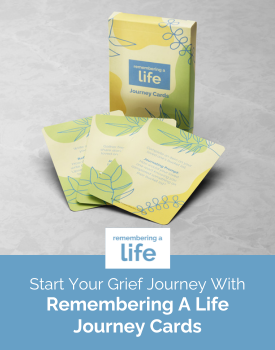"I was angry, and they told me not to be angry. I wanted to talk about how my dad died, and they told me to lie about how he died. I stood in line at the funeral and said the word ‘accident’ over and over again instead of the word ‘addiction.’ When I cried, I cried alone. When I tried to talk about how powerless I felt, they told me that they understood but that I would get over it. They didn’t understand and my grief never resolved. I wish that people in general, and especially people who work with those who have lost a loved one, understood that not everyone is dealt an equal hand in terms of being allowed to grieve openly." - Allie
Grief is one of the universal experiences of the human condition, but it is also completely individualistic in regard to how we experience it. No two people have the same grief experience because no two experiences of loss are identical.
The quote above was written by a former student of mine, Allie, and it encapsulates the pain of disenfranchised grief. As she experienced and observes, not everyone is “dealt an equal hand” in being allowed to express, comprehend, and validate their unique grief responses. Far too often, grief is disenfranchised, meaning that survivors are not afforded a "right to grieve."
Over the last thirty years, thanatologists – experts in death, dying, and bereavement – have developed an expanded understanding of disenfranchised grief, including contributory risk factors for developing it and the effects it has on survivors. However, perhaps more people than ever in American culture are suffering from disenfranchised grief, often desperately hoping that their grief responses will be recognized by others, that their reactions to their loved one’s death will be validated by others, and that any stigma or diminishment of their loss will be lifted so they may be able to understand and process their loss and self-direct their mourning.
What is disenfranchised grief?
Disenfranchised grief can be experienced by anyone who is suffering a loss when:
- Their grief is not openly acknowledged
- Their grief is not socially validated
- Their grief is not publicly observed
When grief is not openly acknowledged, survivors may feel the need to grieve secretly and silently, hiding their grief from others because their loss isn’t recognized. Similarly, when grief is not socially validated, survivors may attempt to share their loss with others only to experience attempts by others to diminish their grief. When grief is not publicly observed, survivors are not given the recognition and support needed to move forward in their mourning process.
Grief is our emotional response to loss. Many emotions may be present after the death of a loved one – anger, guilt, sadness, depression, loneliness, hopelessness, and numbness are all common reactions to loss. When someone experiences disenfranchisement of their grief, all of these emotional responses can increase in intensity and become overwhelming. Often, persons who experience disenfranchised grief additionally experience emotions of powerlessness and helplessness, which can jeopardize their ability to be self-directed in responding healthily to their loss. Long-term risks of disenfranchised grief include social withdrawal, depression, anxiety disorders, and suicidality.
Who is at risk for experiencing disenfranchised grief?
I am frequently asked about the prevalence of disenfranchised grief and loss experiences. Who experiences this phenomenon? The short answer is: most people. Throughout my teaching, research, and professional education work over the last twelve years, I have met few individuals who have never experienced the mitigation, invalidation, or disenfranchisement of their loss by other people.
From the middle aged woman who served as the primary caretaker for her mother for ten years before her death and was told by relatives that she "shouldn’t” be upset because “it was her time," to the couple who experienced the intrauterine fetal death of their child and was told by family members that it would be "too morbid" to have a funeral and that they should focus on "trying again," experiences of disenfranchised grief are everywhere. Survivors carry these experiences with them, often still feeling the pain of having their grief unrecognized for the rest of their lives.
Essentially, disenfranchised grief is dependent on others’ responses to our losses. While anyone can experience disenfranchised grief, it is important to consider three components of the loss experience, all of which may contribute to being at higher risk for more severe disenfranchisement.
Relationship with the deceased
Just as our unique relationships with our loved ones impact our individual grieving experiences, so too can our relationships impact the degree of social support we receive. Relationships that were marked by physical or emotional estrangement, histories of trauma or abuse, or “unfinished business” can make survivors’ grief more complicated. These types of relationships also carry a high risk of disenfranchisement, as others may assume that the survivor is not greatly affected by the loss, or in some cases, that they are feeling only relief or anger instead of sadness or any combination of other grief emotions.
Cultural Systems of Privilege and Inequality
For survivors who are already experiencing systemic oppression due to social inequality, public recognition of their grief and support for their losses may be particularly diminished. Racial, cultural, or religious bias may severely impact members of communities affected by loss. Ageism may cause survivors to be treated as if they are too young to grieve or, alternatively, too old not to have expected the loss. Social stigma experienced by persons in the LGBTQ+ community may prevent them from receiving attention and support in their grief. Due to class disparities, impoverished, homeless, and transient grievers are often unseen in their grief and excluded from mourning rituals.
Cause of Death
While survivors of all types of death losses experience disenfranchised grief, those who lose loved ones as a result of stigmatized deaths, such as suicide, homicide, and substance use disorders, may be at highest risk for unhelpful and damaging responses to their grief. Suicide, which may be the most culturally misunderstood means of death, often leads to survivors being unsupported and ostracized following the death of their loved one. Following a homicide death, survivors may find their loved one – and themselves – thrust into a media spotlight while not being given support in their grief. Substance use disorder-related deaths, which are part of our national conversation on the opioid crisis, are still often treated as an act free will rather than the tragic result of a terrible disease. Survivors of these three types of death losses often report high levels of judgment and stigma from others, leading to the need to grieve intensely and in isolation.


